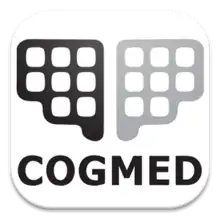Cogmed
Cogmed was a company that developed a cognitive training software program. The company was founded based on software created in the lab of Torkel Klingberg, a neuroscientist at the Karolinska Institute, who was using it to present working memory challenges to people while he studied their brains using fMRI, to try to learn about neuroplasticity.[1][2] When the studies appeared to show that the challenges improved working memory, Klingberg founded Cogmed in 2001, with financial backing from the Karolinska Institute and venture capitalists.[2][3]
 | |
| Type | Subsidiary |
|---|---|
| Industry | Cognitive training |
| Fate | Acquired in 2010 |
| Founded | 2001 in Stockholm, Sweden[1] |
| Products | Cogmed Working Memory Training |
| Parent | Pearson Education |
| Website | cogmed |
Cogmed's initial marketing was focused on helping people with attention deficit hyperactivity disorder and expanded to other impairments of working memory, such as persons with learning disabilities, and people who had a stroke or other traumatic brain injury.[1][3][4]
In 2010, Cogmed was purchased by Pearson Education and became a part of the Pearson Clinical Assessment Group.[5][6] Karolinksa received 22m SEK and double digit royalties as part of the transaction.[7]
A 2012 meta-analysis of 23 research studies on seven different commercial and non-commercial working memory training techniques (including Cogmed) found that "working memory training programs give only near-transfer effects, and there is no convincing evidence that even such near-transfer effects are durable."[8] Another 2012 review of Cogmed found that many of the problem-solving or training tasks presented in Cogmed are not related to working memory, that many of the attention tasks are unrelated to ADHD, and that there is limited transfer to real-life manifestations of attention deficits, concluding "The only unequivocal statement that can be made is that Cogmed will improve performance on tasks that resemble Cogmed training."[9]
The company's marketing efforts have been described in popular media.[10] A 2013 article in The New Yorker magazine said that brain training games are "bogus."[1][6]
See also
References
- Michael Fitzgerald (2014-10-09). "Do brain games work?". The Boston Globe.
- Kenward, Michael (5 December 2007). "Torkel Klingberg: More than just a computer game". ScienceBusiness.
- Sinha, Gunjan (2005-07-11). "Training the Brain". Scientific American.
- "Cogmed Claims and Evidence" (PDF). cogmed.com. Pearson Education. 2014-06-18. Retrieved 26 May 2015.:5
- "Press release: PsychCorp Announces Acquisition of Cogmed". Pearson. July 14, 2010.
- Gareth Cook (2013-04-05). "Brain Games are Bogus". The New Yorker.
- "Annual Report 2010" (PDF). Karolinska Development. p. 59.
- Melby-Lervag M, Hulme C; Hulme (2012). "Is Working Memory Training Effective? A Meta-Analytic Review" (PDF). Developmental Psychology. 49 (2): 270–291. doi:10.1037/a0028228. PMID 22612437.
- Shipstead, Z; Hicks, K; Engle, RW (2012). "Cogmed working memory training: Does the evidence support the claims?". Journal of Applied Research in Memory and Cognition. 1 (3): 185–193. doi:10.1016/j.jarmac.2012.06.003.
- Hurley, Dan (31 October 2012). "The Brain Trainers". New York Times.
